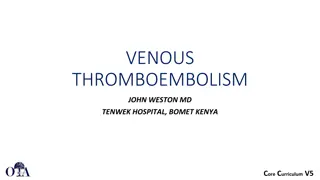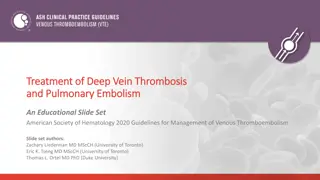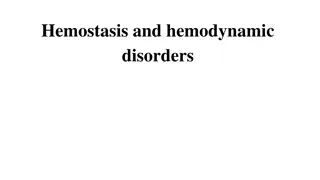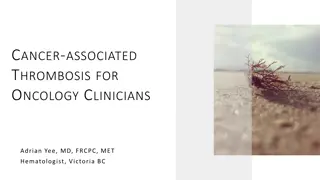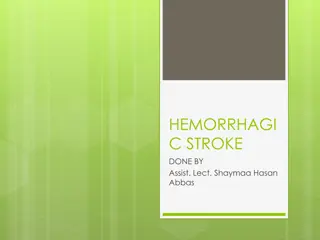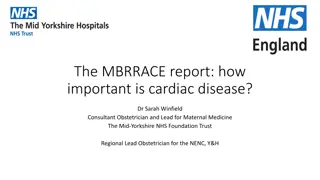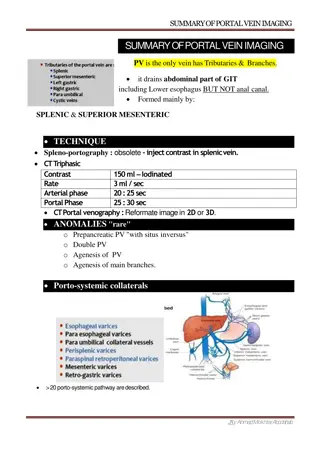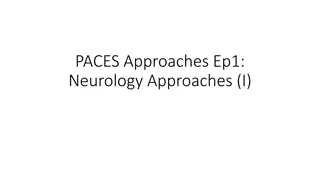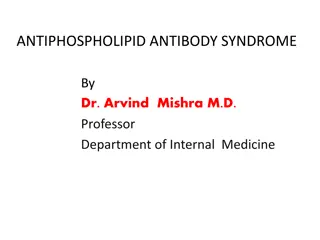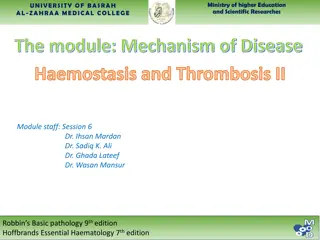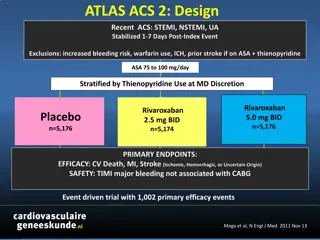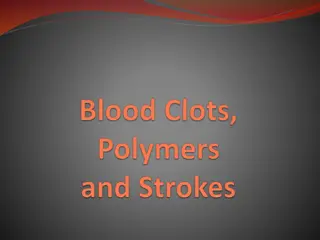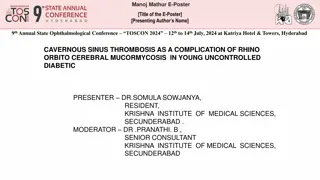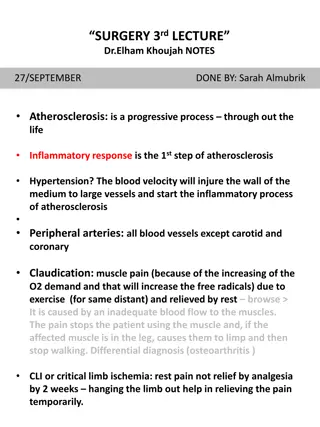Comprehensive ICU Protocol for Sedation, Analgesia, and Delirium Control by Dr. Vinod Srivastava
This comprehensive ICU protocol by Dr. Vinod Srivastava, an Associate Professor in Anaesthesiology & Critical Care at KGMU, covers key aspects such as sedation, analgesia, delirium assessment and control, stress ulcer and deep vein thrombosis prophylaxis, and glycaemic control in the ICU setting. Th
1 views • 50 slides
Understanding Paroxysmal Nocturnal Hemoglobinuria (PNH)
Paroxysmal Nocturnal Hemoglobinuria (PNH) is a rare blood disorder characterized by the destruction of red blood cells in the bloodstream, leading to anemia, hemoglobinuria, jaundice, and other symptoms. It is often challenging to diagnose due to its rarity. PNH can be a thrombophilic state, causing
0 views • 20 slides
Understanding Venous Thromboembolism in Orthopedic Patients
This educational content covers the basics of deep vein thrombosis (DVT) and pulmonary embolism (PE), including definitions, pathophysiology, risk factors, prevention strategies, diagnosis, and treatment. Traumatic and non-traumatic risk factors for VTE in orthopedic patients are discussed, emphasiz
0 views • 36 slides
Understanding Neurogenic Speech and Language Disorders in Adults
This chapter provides insight into language disorders in adults, including types of aphasia, causes such as toxins, traumatic brain injury, brain tumors, and strokes. It discusses cerebral hemorrhage, occlusive strokes, ischemic stroke, transient ischemic attacks, and cerebral thrombosis. The conten
1 views • 34 slides
Antibodies in Vaccines: Risks and Case Studies
Explore the impact of antibodies in vaccines and their link to autoimmune diseases through case studies. Uncover the safety signals related to various antibodies and their potential risks in COVID vaccine recipients. Discover how antibodies like Beta-2 Glycoprotein, Antiplatelet, and DNA can lead to
0 views • 9 slides
ASH Guidelines 2020: Management of Venous Thromboembolism
American Society of Hematology (ASH) released guidelines in 2020 for the management of Venous Thromboembolism, focusing on deep vein thrombosis and pulmonary embolism. These guidelines cover prevention, treatment, and optimal management strategies. The recommendations are developed through a rigorou
0 views • 45 slides
Understanding Hemostasis and Hemodynamic Disorders in Health
Hemostasis is crucial for maintaining the health of cells and tissues by ensuring continuous circulation of water, oxygen, and nutrients while removing metabolic waste products. Factors controlling normal hemostasis include the integrity of blood vessel walls, blood content, platelet function, and l
0 views • 14 slides
Clinical Notes on Vascular Line & Fluid Therapy by Dr. Ali Egab
This collection of clinical notes by Dr. Ali Egab covers various aspects of vascular access, types of veins used for IV therapy, considerations in vein selection, equipment for IV therapy, cannula gauge, rate of infusion, and local complications of vascular lines. The notes provide valuable insights
0 views • 22 slides
Understanding Cancer-Associated Thrombosis for Oncology Clinicians
This presentation explores the common complications of cancer-associated thrombosis and its impact on cancer patients. It covers risk factors, management approaches, and individualized plans, emphasizing the importance of early identification and mitigation. The content also includes a case study hi
0 views • 33 slides
Comprehensive Treatment Guidelines for Acute Ischemic Stroke
In the management of acute ischemic stroke, the primary goals are to reduce secondary brain damage, maintain adequate perfusion, and prevent recurrent strokes by managing risk factors. Treatment includes maintaining tissue oxygenation, correcting volume status and electrolytes, managing blood glucos
0 views • 20 slides
Treatment Strategies for Hemorrhagic Stroke: Goals and Management
Short-term goals for treating hemorrhagic stroke involve rapid neurointensive care to maintain adequate oxygenation, breathing, and circulation, along with managing increased intracranial pressure and blood pressure. Long-term management focuses on preventing complications, recurrent bleeding, delay
11 views • 9 slides
The Importance of Addressing Cardiovascular Disease in Maternal Health
Cardiovascular disease remains a significant contributor to maternal mortality in the UK, with maternal deaths from cardiac issues outnumbering those from other direct causes, except thrombosis. The prevalence of cardiovascular risk factors in pregnant women, combined with a lack of consideration fo
0 views • 22 slides
Portal Vein Imaging Techniques and Anomalies Overview
Portal vein imaging is crucial for evaluating conditions affecting the abdominal part of the gastrointestinal tract. Techniques such as spleno-portography and CT triphasic contrast imaging are used to visualize the portal vein and diagnose anomalies like portal-systemic collaterals and porto-systemi
4 views • 7 slides
Red Cell Teaching Cases: Anemia Evaluation and Differential Diagnosis
Course Directors Breakfast session at ASH 2012 highlighting various aspects of red cell disorders, including case discussions, laboratory findings, and clinical considerations. Case 1 involves a 35-year-old woman presenting with anemia symptoms, requiring detailed evaluation and management. The sess
0 views • 70 slides
Approach to Headache and Neurological Symptoms in Clinical Practice
Comprehensive overview of primary and secondary headaches, red flags, and patterns in neurological presentations. Discusses distinguishing features, differential diagnoses, and management approaches for various conditions affecting the central and peripheral nervous system. Highlights important cond
0 views • 16 slides
Understanding Antiphospholipid Antibody Syndrome and Its Clinical Implications
Antiphospholipid antibody syndrome is an acquired disorder characterized by recurrent thrombosis or pregnancy complications due to autoantibodies against phospholipid-binding plasma proteins. Learn about its classification, epidemiology, pathogenesis, and diagnostic antibodies. Discover how lupus an
0 views • 35 slides
Understanding Embolism and Venous Thrombosis in Mechanism of Disease
Embolism, defined as a detached intravascular mass carried through the blood, poses serious risks like pulmonary embolism. Venous thrombosis, particularly deep vein thrombosis (DVT), can lead to embolization, emphasizing the importance of understanding these mechanisms in medical practice.
0 views • 40 slides
Understanding Anticoagulants: Mechanisms, Indications, and Limitations
Anticoagulants play a crucial role in preventing blood clotting and are used in various medical conditions such as myocardial infarction and deep venous thrombosis. They include heparin, warfarin, and antiplatelet agents like aspirin. This article explores the mechanisms of action, indications, and
0 views • 29 slides
Clinical Trial Results of Rivaroxaban in ACS Patients: ATLAS-ACS 2 Study
The ATLAS-ACS 2 study investigated the efficacy and safety of rivaroxaban in ACS patients post-index event. The primary endpoints included cardiovascular death, MI, and stroke, with significant reductions seen with rivaroxaban compared to placebo. Stent thrombosis was also reduced with rivaroxaban t
0 views • 10 slides
Sudden Death and Pulmonary Embolism in a Forensic Medicine Case Study
A 57-year-old woman admitted for abdominal pain tragically dies from a pulmonary embolism after collapsing outside the hospital. This case study delves into the definition of sudden death, major causes within the respiratory organs, and predisposing factors like deep vein thrombosis. References incl
0 views • 5 slides
Understanding Blood Clots, Vessel Blockage, and Strokes
Polymers, blood clots, vessel blockages, and strokes are explained in this informative content. Blood clot formation, vessel blockages due to embolism and thrombosis, and the different types of strokes are detailed. The effects of stroke on the brain and its various regions are highlighted.
0 views • 11 slides
Cavernous Sinus Thrombosis Complication in Young Diabetic - Case Study from TOSCON 2024
Cavernous sinus thrombosis is a severe complication of rhino-orbito-cerebral mucormycosis in a young uncontrolled diabetic patient presented at the 9th Annual State Ophthalmological Conference (TOSCON) 2024. The case involves a 30-year-old male with diabetes, experiencing headache, fever, and rapid
0 views • 6 slides
Understanding Atherosclerosis and Peripheral Artery Diseases
Atherosclerosis is a progressive process triggered by an inflammatory response, often aggravated by hypertension. Conditions like claudication and critical limb ischemia are indications of inadequate blood flow, posing risks of rest pain and ischemic ulcers. Recognizing symptoms like pain, numbness,
0 views • 4 slides


